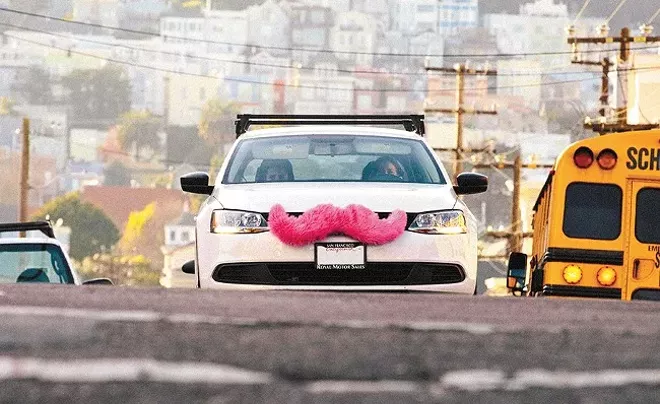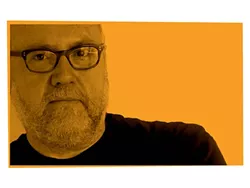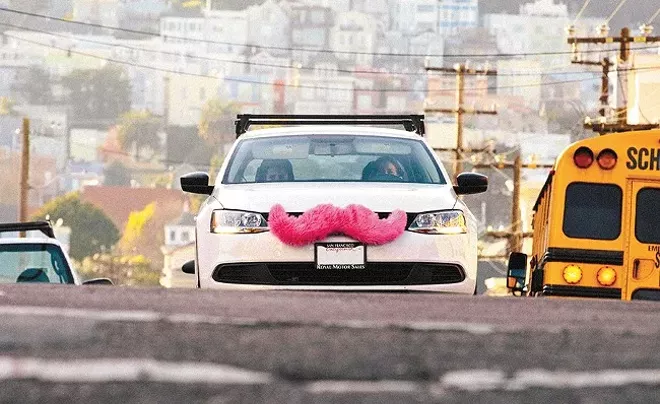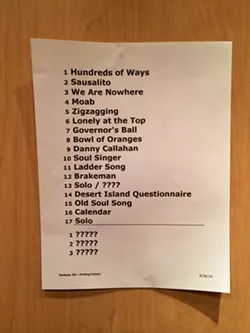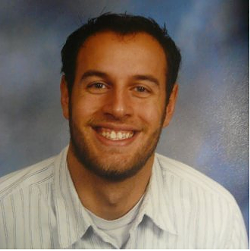Tuesday, September 30, 2014
Kellen "K-Rad" Faker-Boyle, has been writing and performing his raps since his sophomore year at Gonzaga University two years ago, and since then has been working tirelessly to compile an album to showcase his passion for producing music.
With primary themes of "perspective, self-doubt, love and being weird," according to Faker-Boyle, Nerd Eyes explores the coming-of age thoughts and stories of a self-aware college kid. Though it's somewhat introspective, the mood is mostly lighthearted and goofy.
His self-deprecating humor, especially in the title track, invites us to appreciate the uniqueness of a dorky guy in glasses who flaunts his talent in an industry that relies heavily on simply fitting an image. Faker-Boyle certainly is not apologizing for being himself.
Nerd Eyes, a 15-track album with several outside collaborations, drops on September 30th and will available for download on K-Rad's Bandcamp page.
Starting Jan. 1, the minimum wage in Washington — already the nation's highest — will rise 15 cents to $9.47 an hour, the Department of Labor and Industries announced today.
Thanks to Initiative 688, passed by voters in 1998, the DOL is required to calculate the minimum wage every year on Sept. 30 to keep up with the rising rate of inflation. The new minimum wage is adjusted using the Consumer Price Index for urban wage earners and clerical workers — a measure that tracks the average change in prices of more than 200 types of goods and services paid for by low-wage households.
Still, living-wage advocates argue that even $9.47 an hour isn't enough for low-income families trying to get by. According to a study released last month by the Alliance for a Just Society, single adults in Washington must make $15.99 an hour in order to meet their basic needs, pay taxes and save 10 percent of their incomes in case of emergencies. In Spokane County alone, the living wage is $14.20 an hour, the study says.
"For us, a living wage really is not just surviving," says Allyson Fredericksen, a policy associate at the Alliance for a Just Society. "It's having that ability to feel stable and not have to worry every month where that money is coming from."
The DOL says the increased minimum wage will impact more than 67,000 workers across the state, who will take home an additional $312 a year.
Tags: minimum wage , News , Image
HERE
Spokane writer Shawn Vestal was named the winner of the 2014 PEN Prize for his debut short story collection Godforsaken Idaho. (Inlander)
Police are still searching for a suspect in a shooting yesterday afternoon in Spokane Valley. (KXLY)
WSU received a $300,000 grant from the U.S. Justice Department to go toward its sexual assault and violence prevention programs. (KXLY)
THERE
U.S. Secret Service director Julia Pierson was criticized by lawmakers from both sides of the aisle for recent White House security breaches. (NYT)
Could Mitt Romney be considering another run for the White House? (HuffPo)
The Colorado Supreme Court is hearing arguments in a case regarding a quadriplegic medical marijuana user who was fired before pot became legal there for failing a drug test. (King 5)
AWW-WORTHY ANIMALS!
Firefighters responding to a house fire in Lacey, Washington, last week improvised to save several tiny lives. (The Dodo)
Sightings of a rare species of white-sided dolphins, more common in the extreme North Pacific, have been reported in the San Juan Islands. (King 5)
Tags: morning briefing , News , Image
Monday, September 29, 2014
Another day, another reminder of Spokane's status as a booming literary destination...
This evening in a ceremony in New York City, Shawn Vestal, who spends his day job writing those damn good editorials for the Spokesman Review, was named the winner of the PEN/Robert W. Bingham Prize for his debut short story collection Godforsaken Idaho.
The judges for the award said that Vestal's stories "dare to charge into the well-trodden arena of the hapless male and make that subject fresh again.”
With the award, Vestal takes home a purse of $25,000 and the knowledge that, at least for today, Jess Walter is not Spokane's most famous author.
Tags: Shawn Vestal , Books , Culture , Arts & Culture , Image
This one's for you, disciples of the so-called "sharing economy." The Spokane City Council looks set to clear the way tonight for ride-share services Uber and Lyft, while slimming regulations for taxis.
The service Uber and Lyft provides isn’t quite pure friend-to-friend sharing (you’re paying a stranger to drive you somewhere), but it’s also not quite the same as operating a taxi company (drivers can work however much or little as they want; they’re using their own vehicles; there are no running meters). That’s made crafting regulations for them an issue across the country.
Spokane's proposed fix comes in the form of two nine-month agreements with Uber and Lyft allowing them to operate here until the city figures out how it will permanently regulate the companies. The agreements require the companies to pay the city 10 cents on every ride its drivers make. They also include mandatory safety precautions like vehicle inspections, driver training and zero-tolerance drug and alcohol policies — all of which exist in Uber and Lyft’s current driver policies.
Meanwhile, changes to taxi rules are meant to quiet some of the taxi backlash over ride-sharing by making it easier for taxi companies to get inspections and hire new drivers. Previously, city code specified a few mechanics who could inspect taxis, which taxi company owners claimed allowed those mechanics to inflate prices. Now, they’ll be able to use any certified mechanic. The change will also add a free temporary license taxi drivers can get for their first 60 days of driving. Company owners have complained that if a new driver doesn’t last, they take a serious financial hit. (In total, state and city licenses and inspections run $2,000 per cab, one taxi company owner told the Inlander, and Uber and Lyft don't have to pay some of those fees.) The 60-day license is meant to help companies make sure drivers are a good fit before they pay the city's licensing fees, which Councilman Mike Fagan says can add up to about $500.
Uber and Lyft have been operating in Spokane since this spring and room-sharing has been here a while too. This effort to "level the playing field," as politicians like to say, has been led by Fagan and Council President Ben Stuckart. The full council will take public testimony and vote on all three measures tonight at 6 pm in council chambers at 808 W. Spokane Falls Blvd.
Tags: uber , lyft , taxis , city hall , city council , News , Image
Later this week, we'll share the caption Dave had on his cartoon, as well as our favorite submission from our reader, right back here at Bloglander.
Tags: art , cartoon , caption contest , For Fun! , Image
For anyone familiar with Omaha/New York-based Oberst, he has a reputation for not always being kind. But “Thank you so much,” peppered his set between most songs. When an audience member near the front screamed that she loved him, he responded with an “I love you too.” He even told us about exploring Spokane and how glad he was to be back.
“What a beautiful place you live in,” he said. “I took a romantic gondola ride with my manager.”
His performance was a mix of alt-country, 1970s' rock and a little bit of acoustic emo thrown in for good measure. Parts of the set were legitimately joyous, a celebration of the human experience. Depending on the song, his backing band featured up to seven musicians. Especially impressive was Jonathan Wilson, who produced Oberst’s newest record, on lead guitar and backing vocals, and trumpet/keyboard player Nate Walcott, who has been with Oberst since Bright Eyes. Yes, his most recent album Upside Down Mountain is an Americana work, but the show was more countrified than expected. It’s as if his introspective lyrics have simply been waiting all of this time to be backed up by a steel string guitar.
The show led off strong with a single from his new album, “Hundreds of Ways.” Audience members mouthed along with the song, swaying to the upbeat instrumentation. Anytime Oberst went into a song off the new record people cheered, a feat for any established artist, especially one who has musically reinvented himself.
“Moab,” from Oberst’s self-titled LP, was simply gorgeous with its three-part harmony on the chorus. The words, “There’s nothing that the road cannot heal” washed over the audience like a new-age gospel.
Midway through, Oberst switched to piano, going into the particularly melancholy Bright Eyes track, “Ladder Song," about not being alone in anything.
Thankfully, the keyboard didn’t last long, and soon he was back with an acoustic guitar in hand playing the most beautiful song of the entire evening, “Lua.” The Bright Eyes song was enhanced by Walcott’s trumpet accompaniment, transporting us to New York in the winter. While it played, everyone held their breath.
But things weren’t slow for long, “The Calendar Hung Itself” was the heaviest song of the night. Here, Oberst even let his trademark mass of messy black hair fly around. “This one I should be embarrassed by,” he said in introduction. “I wrote is when I was 19, now I’m f—-ing 34. I wrote this after my first adolecent heartbreak. Of course, every day is heartbreaking …”
After one more acoustic solo piece, "Common Knowledge," he left the stage. Calls were wild for his return. Finally, after an interlude, Oberst emerged with a fresh shirt on, played a couple more including John Prine's "Pretty Good," and then went into extra innings with the especially rocking “Roosevelt Room.” The reverb got loud and the song went on and on in the best way possible. For a Sunday night, concert-goers held on well past 11 pm.
At the very end of the show, he bowed about 13 times, blowing kisses, hands extended from his heart. He said “thank you,” and meant it. To his fans at last night’s show, Oberst was more than wonderful.
Tags: Conor Oberst , Knitting Factory , concert review , Music , Image
HERE
Not so hot off the presses — the Spokesman-Review's Saturday and Sunday editions were delayed and some papers were incomplete due to a press problem. (S-R)
Three suspicious brush fires and a house fire over the weekend are believed to be part of a string of 23 suspected arson fires in Southeast Spokane County. (KXLY)
The Nine Mile Falls man accused of killing his girlfriend and disposing of her body in a manner similar to a portrayal on Breaking Bad is scheduled to take a plea deal today. (KREM)
THERE
Take some time out today to read this well-done, interactive piece on the dark side of North Dakota's oil boom. (WaPost)
President Obama said this weekend the U.S. underestimated the threat of ISIS militants, but also overestimated the Iraqi army's willingness to fight. (HuffPo)
Police are seeking two suspects in unrelated, non-lethal shootings of two police officers in Ferguson, Missouri — the same St. Louis suburb where an officer shot and killed unarmed teen Michael Brown last month. (Reuters)
Weekend protests led by students in Hong Kong to demand a democratic election in China are continuing today, as residents defy government orders to abandon streets. (NYT)
Tags: morning briefing , News , Image
So, on Thursday, October 23, find your tattered jeans and best black t-shirt and come to the Bing Crosby Theater with your air guitar well practiced for a screening of perhaps the best Saturday Night Live spin-off film of all time. If you're not hip to Suds and Cinema, here's how it works: we show a movie you've probably seen and probably love, and show it to you while you drink locally crafted beer.
For this installment, we're bringing in the Northwest's best lager maker, Orlison Brewing, who will be pouring a couple of their popular brews. Their crew will be on hand to let you know what's going on out at their Airway Heights production facility and probably let you have a sticker, if you're not a jerk about it.
So why Wayne's World? First off, why not? Secondly, it's an excellent encapsulation of the early 1990s, as told through the eyes of two guys who live with their parents but are outrageously popular for their public access television show. There's corporate greed (Rob Lowe!), rock and roll (Alice Cooper cameo!), a classic '90s babe who knows both martial arts and wicked bass lines (Tia Carrere!) and a number of classic lines about gun racks, puking, "schwinging," Grey Poupon and much, much more. So yeah, it wasn't a difficult decision.
We'll get beers pouring at 6:30 pm and then start the movie at 7:30. As always, it's $4 to get in and $4 pints of beer. Stay tuned for costume contest and giveaway details.
In the meantime....
Tags: Suds & Cinema , Wayne's World , Film , Image , Video
Friday, September 26, 2014
Travis Franklin is only 30. Eight years ago, he was a fresh-faced Whitworth College graduate, ready to become a teacher.
But now, the former Mead School District teacher (and the brother-in-law of former Inlander freelancer Blair Franklin) is preparing for the launch next fall of one of Spokane’s most ambitious schools: The Spokane International Academy.
On Wednesday night, the charter school was approved by Spokane Public Schools as the second charter in the city. Almost immediately, interest began flooding in.
“Yesterday, I had about 30 e-mails looking to enroll their kids in our school,” Franklin said Friday morning.
In one sense the Academy is the sort – high standards, language immersion, and international travel – that appeals to elite, wealthy and hyper-involved parents. But that’s not the only type of student he wants. He also wants to focus on low-income and refugee students, some who struggle to speak English.
It's in the former St. Patrick’s School building, square in the middle of the economically depressed Hillyard neighborhood. That’s intentional. By being close to many of those families, he hopes, it will be easier to attract them.
For the last three months, he and his team have been embedding themselves in the Hillyard neighborhood, meeting businesses, parents and community groups. He's been doing the same with organizations who work with refugees. “I meet weekly with families with World Relief, to help those families understand that there are options,” Franklin say.
They’ll use the internationally recognized and lauded Cambridge curriculum. (North Central High School already uses the Cambridge course for high school. We wrote about it here.)
Foreign language instruction, through the Rosetta Stone curriculum, is a given. “All of our students will learn a second language. In the case of some of our refugee students, they’ll know two or three or four already,” Franklin says. “But they just don’t know English.”
It all builds up to the 8th grade year.
In the first half of that year, students will take on a very big issue, like water quality or housing availability, and then examine it thoroughly at the local, state, national or international level. In the second half, they’ll expand out to study how that issue impacts a foreign country.
And here’s the capper: At the end of the year the student will travel to that country.
“Every [8th grade] kid, is going to go, for free, on an international humanitarian trip at the end of school… It’s already written into our budget,” Franklin says. “One of the things about being a charter school, we have a lot of flexibility with our finances.”
Franklin’s brimming with other ideas. He wants to partner with World Relief, Whitworth, and Gonzaga University to train teachers in how to modify lessons for non-native English speakers. Considering the number of skilled soccer players among the local refugee population, the school could run its own soccer club. And it only costs $1.50 per student to use Spokane Transit Authority buses for field trips. So when they’re learning about water, Franklin suggests, they could visit with the Riverkeeper or take a trip to the hatchery. When they learn about aeronautics, they could go to Fairchild.
"I have this really strong passion to mine all of these resources in Spokane," Franklin says.
If all goes as planned, the Spokane International Academy will open next fall. They’ll begin with 120 students – in grades kindergarten, first and 6th – and eventually grow to 450 students, from kindergarten through 8th grade.
Check out his lengthy application here.


